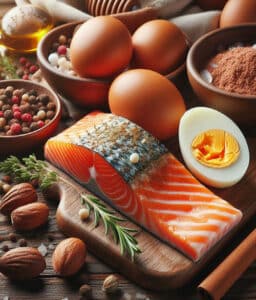Sexual health and nutrition
Food and sex
Much of the stories about the effects of certain foods on sexual desire and performance are anecdotal. But a balanced diet can indeed help improve our libido and ensure that our body functions as it should.
In turn.
An unhealthy diet can lead to a range of health problems that could negatively affect our sex life. For example, erectile dysfunction is often linked to obesity and diabetes.
The frequency and quality of sex are closely linked to a person’s overall health, and food is an essential part of daily life and overall health. Changing your eating habits and behaviour may not solve all your sexual problems, but it is a good start.
How does diet affect our libido and sexual performance?
Sexual health and nutrition are more closely linked than many think – what we put into our bodies determines how they perform.
By filling our bodies with unhealthy foods and drinks and not exercising, we do more harm to ourselves than meets the eye. Having good sexual health and making the right dietary choices is good for our minds and moods as well as our bodies.
The relationship between diet and sex covers various aspects of physical health, hormonal balance and general well-being.
Here are some of the ways that diet can affect sexual health:
Nutrient deficiencies
A balanced diet that includes essential nutrients such as vitamins (e.g. vitamin C and vitamin E), minerals (e.g. zinc and magnesium), antioxidants, fibre and probiotics supports various bodily functions, including those related to libido and sexual function – promoting the proper functioning of physiological processes related to sexual health, including hormone production, blood flow and nerve function.
Libido and sexual function are positively affected by:
- Zinc, as it plays an essential role in testosterone production (which has a significant effect on libido). Adequate zinc levels can promote healthy libido and support reproductive health in both men and women. Good sources of zinc include oysters, beef, chicken, nuts and seeds.
- Omega-3 fatty acids are good for cardiovascular health and can improve blood circulation and promote hormone regulation, thus improving overall well-being and sexual function. Good sources of Omega-3 are oily fish (salmon, mackerel), flaxseeds, chia seeds, walnuts.
- Vitamins E and C are antioxidants that help protect cells from damage (reduce oxidative stress) and promote overall vascular health. Good sources of vitamins E and C are citrus fruits, berries, nuts, seeds and green leafy vegetables.
Libido and sexual function are negatively affected by:
- Excessive alcohol consumption can affect the nervous system, blood circulation and hormone regulation. But chronic alcohol abuse can lead to impaired sexual function, reduced libido and difficulty in achieving or maintaining an erection.
- Diets high in ultra-processed foods and added sugar can contribute to inflammation, insulin resistance and weight gain. Inflammation and insulin resistance can upset hormonal balance, which, like obesity, can lead to decreased libido and sexual dysfunction.
- Insufficient intake of essential nutrients can hurt overall health, including sexual function. Nutrient deficiencies can lead to fatigue, reduced energy levels and hormonal imbalances, which in turn can affect sexual desire and performance.
Cardiovascular health
Cardiovascular health is most directly linked to sexual function, as blood supplies our organs with oxygen and nutrients (including the organs involved in sexual function). Blood flow disorders reduce the amount of blood reaching the genitals, which can cause erectile difficulties in men and in women can reduce the blood flow needed to ‘wake up’ and hydrate the vagina.
Medications used to treat cardiovascular disease can also reduce interest in sex or cause difficulties in achieving erection and orgasm.
In other words, good cardiovascular health is the first prerequisite for a fulfilling sex life.
Cardiovascular health is improved by:
- Regular aerobic exercise such as running, swimming or cycling improves cardiovascular health, which in turn boosts both sexual arousal and sexual function. Physical activity also stimulates the release of endorphins, which can have a positive effect on mood and libido.
- A heart-healthy diet – fruits, vegetables, whole-grain products, lean proteins and healthy fats promote blood flow. Foods rich in antioxidants also protect blood vessels and reduce the risk of atherosclerosis.
- Maintenance of a healthy weight. Obesity is a risk factor for cardiovascular disease. Maintaining a healthy weight through a balanced diet and regular exercise contributes to heart health and reduces the risk of diseases that can lead to sexual dysfunction.
Cardiovascular health is negatively affected by:
- Smoking is a major risk factor for cardiovascular disease. It narrows blood vessels, reduces oxygen supply and contributes to the development of atherosclerosis. Smoking increases the risk of erectile dysfunction in men and reduces arousability in women.
- High blood pressure (hypertension) can damage blood vessels, affecting their ability to provide adequate blood flow to the genitals. This can cause erectile dysfunction in men and reduce blood flow to the vagina in women. Some blood pressure medications can also cause unwanted sexual side effects. One of the causes of high blood pressure is too much sodium (salt) in the diet.
- High levels of LDL cholesterol (low-density lipoprotein) can cause blood vessel narrowing and sexual dysfunction. LDL cholesterol levels can rise if the diet is high in saturated and trans-fatty acids (deep-fried foods and industrial baked goods).
Hormonal balance
Some foods can affect hormone levels, thereby affecting sexual desire and function.
Hormones play a crucial role in regulating sexual function in both men and women. Hormone imbalances can affect libido, arousability and overall sexual health. The main hormones associated with sexual function are testosterone, oestrogen, progesterone, cortisol (stress hormone) and oxytocin (love hormone):
- Testosterone is associated with sex drive in both men and women. Adequate testosterone levels contribute to a healthy libido – sex drive, arousal and overall sexual function.
- Estrogen and progesterone are very important for the menstrual cycle and reproductive health in women. A balance of these hormones promotes a regular menstrual cycle, optimal fertility and has a positive effect on libido.
- Cortisol and oxytocin can also influence sexual function – cortisol helps manage stress, while oxytocin is associated with positive emotional bonding and intimacy.
Hormonal disorders affecting sexual function:
- Testosterone deficiency can occur with age or due to medical conditions. In men, it can result in decreased sex drive, erectile dysfunction and fatigue;
- Conditions such as polycystic ovary syndrome (PCOS) or hormonal imbalances associated with menopause can cause irregular menstrual cycles, problems with sexual arousal, vaginal hydration and general sexual satisfaction in women;
- Chronic stress can increase cortisol levels, causing a decrease in sexual desire.
Hydration
Good hydration is vital for overall health and vitality, including sexual health. Dehydration can lead to fatigue and lower energy levels, which can affect sexual performance. Drinking adequate amounts of water promotes bodily functions and maintains high energy levels.
Caffeine
Caffeine in moderation can have a positive effect by increasing alertness and improving blood circulation, but excessive caffeine intake can have a negative effect on sleep and increase stress levels, which can indirectly have a negative impact on sexual desire.
Arginine and L-citrulline
Arginine, known also as L-arginine, is an amino acid used by the body to produce nitric oxide (which helps blood vessels relax), thus promoting good blood flow. In men, good blood flow to the erectile tissue in the penis is crucial for maintaining an erection.
When arginine is taken in supplements, the intestine breaks down most of it before it enters the bloodstream.
L-citrulline is an amino acid that is converted into arginine in the body. A small study published in 2011 found that L-citrulline supplements were effective for mild erectile dysfunction (compared to placebo).
Both of these amino acids are also found in foods. L-citrulline is found in watermelons, while arginine is found in many foods, such as:
- Walnuts.
- Almonds.
- Fish.
- Whey.
- Fruits.
- Leafy vegetables.
Flavonoids
Flavonoids are a broad group of chemicals found in chocolate (with 70% or more cocoa), tea, red wine and almost all fruits and vegetables. Flavonoids not only boost the immune system, are powerful antioxidants and have anti-inflammatory properties – studies show that eating foods rich in flavonoids can also improve erection.
The most beneficial effects of flavonoids have been observed with regular dietary intake:
- Berries – blueberries, blackberries and strawberries.
- Cherries.
- Grapes.
- Apples.
- Pears.
- Citrus fruits.
Support each other
Sometimes food can be a source of stress and conflict in relationships.
But.
Shared meals can also be bonding for both of you.
The brain is the most important sex organ because sex starts with affection, intimacy and desire. Meals are a great way to relax with your partner and build intimacy in a relaxed and enjoyable atmosphere.
Unfortunately – or fortunately – we are very different. Our eating habits are also varied and can lead to conflict if a couple has:
- A vegetarian and an omnivore.
- A foodie/gastronomic adventurer and a traditional food lover.
- A dietary restriction follower and an omnivore.
- etc.
Body weight, eating disorders or specific diets can also affect your self-esteem and hence – your relationship with food and with each other.
If your partner is trying to lose weight, help him/her on this journey.
If you know he/she is an emotional eater, offer support when he/she seems upset, depressed, anxious…
Be supportive of each other, not destructive – criticising your loved one’s food choices will not encourage positive feelings towards you😊.
Key takeaways
The frequency and quality of sex are closely linked to a person’s overall health.
Good nutrition can improve overall sexual function and satisfaction. A well-balanced diet that promotes cardiovascular health, reduces inflammation and provides the body with all the nutrients needed for hormone production can improve sexual function, arousal and pleasure.
Eat a variety of fruits, vegetables, whole grains, legumes, nuts and lean proteins. To avoid weight gain, pay attention to portion sizes.
To help maintain healthy blood cholesterol levels, choose a balanced diet high in fibre and low in saturated and trans-fatty acids. Include foods rich in omega-3 fatty acids in your diet.
Eat balanced, in moderation and – be healthy!
Dietary Approaches to Women’s Sexual and Reproductive Health
Erectile Dysfunction in the Cardiac Patient: How Common and Should We Treat?
Correlation between serum testosterone level and concentrations of copper and zinc in hair tissue
Oral L-citrulline supplementation improves erection hardness in men with mild erectile dysfunction
The importance of folate, zinc and antioxidants in the pathogenesis and prevention of subfertility
Cardiometabolic risk and female sexual health: the Princeton III summary
Zinc: an essential oligoelement
Male factor subfertility: possible causes and the impact of nutritional factors

Help to maintain this site, create interesting articles and delicious low-calorie recipes!
Share this article
Follow me on Facebook
I recommend reading these articles as well

Being Overweight - 5 IMPORTANT Reasons to Get Rid of It
What are the real reasons why you need to get rid of excess weight? And how your life can change when you do.

Why do nutritionists' recommendations differ?
Or Why is the science of nutrition so confusing, and healthy eating is not as simple as we would like?

Weight loss hacks
And why you don't need them, because there is an easier and more effective way to get lasting long-term results.

How much protein do we need?
What is protein? How much protein should we consume every day? How much protein can our body absorb, and how much of it can we use?

